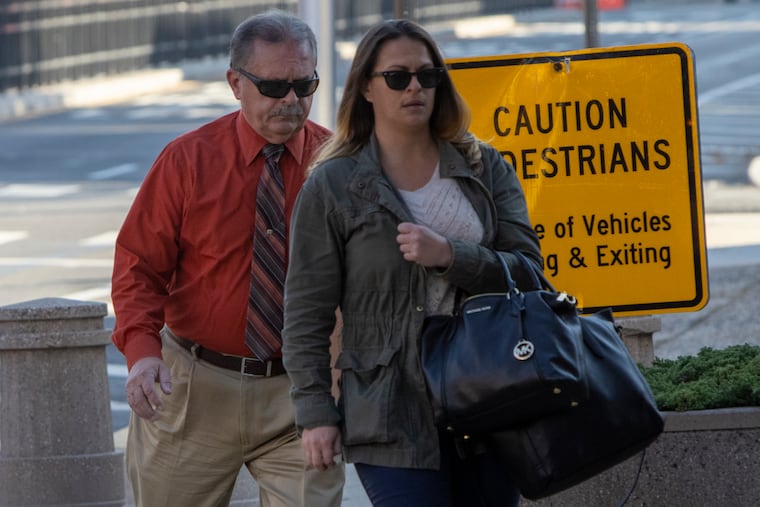Race takes center stage as jury questioning begins in hate-crime trial of former South Jersey police chief
Attorneys began questioning a pool of more than 100 prospective jurors Tuesday to decide who will hear the hate-crime assault trial of ex-Bordentown Township Police Chief Frank Nucera Jr.

Should the use of racist slurs by a police officer be a crime?
The question was among the thorny topics posed Tuesday to potential jurors in the federal hate-crime assault trial of ex-Bordentown Township Police Chief Frank Nucera Jr. He is accused of slamming the head of a handcuffed Black teenager into a door jamb during an arrest.
U.S. District Court Judge Robert Kugler advised prospective jurors that hate speech would be heard during testimony in the trial in Camden. He asked if those who had strong viewpoints about it could serve impartially.
Kugler rejected a request by defense attorney Rocco Cipparone to excuse from consideration a teacher assistant who said he would likely be upset when recorded tapes were played in court of the former chief using slurs. The potential juror said he believed police officers should be held to a higher standard.
”Jurors are going to rightfully be offended,” Kugler said. “They’re allowed to be angry by the N-word.”
It is the second trial for Nucera on two hate crime charges. A jury found him guilty in October 2019 on a single charge of lying to the FBI about the case. The jury was deadlocked on the two more serious counts of hate-crime assault and deprivation of civil rights, and the judge declared a mistrial. Nucera rejected a plea agreement this past summer, setting the stage for this trial.
In a recording played during his previous trial, Nucera could be heard saying, “It’s gonna get to the point where I could shoot one of these [expletives].”
Kugler advised the prospective jurors that racist slurs were not enough for a conviction. He told Cipparone that the jury would receive further instructions before it begins deliberating.
» READ MORE: White guilt’? Jurors in hate-crime trial of ex-South Jersey police chief felt pressured in verdict, lawyer says.
Authorities said Nucera had a history of making derogatory remarks about Black people, saying he wanted to unleash police dogs on spectators at high school football games, and be a part of a firing squad to kill them. He also compared them to ISIS. Fellow officers secretly made 81 recordings where Nucera used racist slurs.
Nucera, 64, was charged with striking Timothy Stroye during an arrest at a Bordentown hotel. Officers said the suspect was not resisting. Police were called to the hotel after Stroye, then 18, allegedly failed to pay for his room.
In a 2017 interview with The Inquirer, Stroye said he believed his life was in danger.
”I thought they were going to shoot me,” Stroye said.
Nucera, a longtime police chief in the predominantly white community, has denied striking Stroye during the Sept. 1, 2016, encounter at a Ramada. The defense has contended that Nucera was wrongly implicated by disgruntled officers.
There had been widespread speculation about whether Stroye would testify at this trial, because he was not called as a witness in the first trial.
But it was disclosed this week that Stroye died in January. He was 22.
The Trentonian, citing law enforcement sources, reported his death was from a suspected overdose. In an online tribute, his family described Stroye as someone who “touched many hearts throughout his life.”
Stroye had a troubled past that included several brushes with the law in New Jersey and Pennsylvania, records show. He had several felony convictions and a juvenile record. His obituary said Stroye, the father of a young daughter, helped rehab homes for a ministry.
In an interview, Cipparone said his death wouldn’t change the landscape of the case.
During questioning Tuesday, Kugler and attorneys methodically questioned potential jurors about their viewpoints on race. Among their queries were questions about defunding the police, Black Lives Matter, and reverse discrimination against whites.
The pool of 116 prospective jurors included teachers, nurses, a surgeon, a pastor, a lawyer, a scientist, a chemist and an engineer.
An unemployed white man from Voorhees said he believed the government has gone too far in advocating for people of color. He said he believed cases of racism exist, but it is not a systemic problem.
”I don’t think we, as a nation, discriminate,” the man said. He qualified for the pool from which the attorney will select a dozen jurors and two alternates.
A Black woman said the government has fallen short. Several people cited the killing of George Floyd last year by Minneapolis police. The son of a retired police officer said the resulting unrest has hurt race relations. Others said Civil War history has been “taken away from us.”
”Everything is being blamed against white people,” one said.
» READ MORE: Jury finds former N.J. police chief guilty of lying to FBI
A handful of Black people were among the potential jurors questioned Tuesday. One woman said the government has fallen short in dealing with racism. Another, a paraprofessional from Millville, was excused after she said her son was racially profiled by state police and she would have a hard time being impartial.
Kugler carefully questioned another Black woman from Willingboro who said she had been called racist names. She also said she had been a victim of racial discrimination.
Jury selection is expected to continue Wednesday. Opening arguments are slated for Friday. The trial is expected to last about three weeks.
Besides the secret recordings, the jury is expected to hear testimony from rank-and-file officers who implicated Nucera. If convicted, Nucera could face 10 years in prison on each count. Kugler sentenced him to 28 months in prison on the charge of lying to the FBI, but allowed him to remain free on bond until the conclusion of this trial.